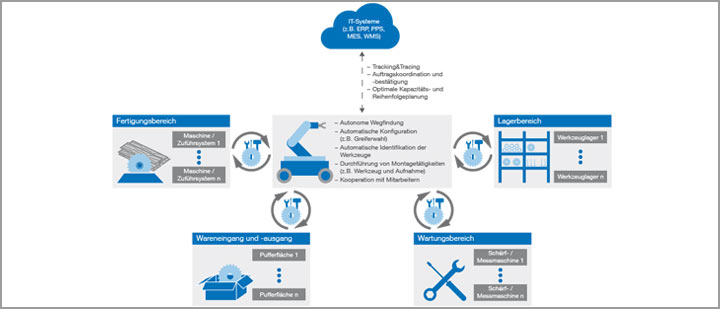As a part of tool management, tool logistics deal with the tool flow as well as the tool-related information flow within production plants. A core task of tool logistics is the timely supply of production machines with the required tools. The tool supply process includes the transport of tools between storage and maintenance areas and the manufacturing system as well as the assembly and disassembly of tools and toolholders. In industrial practice, these processes are currently performed predominantly by hand. Especially for small and medium-sized enterprises (SMEs) in the manufacturing industry, the supply of tools represents a considerable challenge. Due to low quantities with a large number of product variants, a large number of tools has to be provided on machines on time and set-up processes must be initiated.
In order to minimize plant downtimes, set-up processes and tool logistics have to be as efficient and robust as possible. However, the large proportion of manual activities in the tool supply leads to plant operators having to spend up to 25 % of their working time on the provision of tools. This time is spent on search operations and travel times between the tool store and the point of use. Consequently, around 15 % of production orders are interrupted due to tools not being available on time.
To increase efficiency and reliability of tool logistics, the AutoWerk project is developing a holistic concept for automated and interconnected tool logistics. In this concept, mobile assistance robots will execute all transport processes autonomously. In addition, intelligent routing strategies will ensure the timely supply of tools to the machines. Using an integrated manipulator with specially developed grippers, the assistance robots are able to perform handling operations for picking up and delivering tools. The selection of the gripper required in each case happens automatically according to the current task. This enables the mobile robots to perform simple quality assurance and assembly tasks during transport. A central control system will be controlling and coordinating the robots as well as the supervision and monitoring of tool logistics. Therefore, the control system has to be able to communicate with the robots as well as production and IT systems such as ERP, PPS or WMS. At the same time, workers will have the possibility to interact with the robots and the control system intuitively and without specific knowledge. The support provided by mobile assistance robotics relieves the plant operator and enables him to focus on value-adding activities.
The first step in the project is to define relevant use cases for the use of mobile assistance robots in tool logistics. The project’s industry partners will support this process by contributing their practical experience. Based on this, processes, material and information flows of the application scenarios are recorded in detail, analysed and transferred to a requirements list. Using a simulation model, the automation potential of the application scenarios is to be evaluated and the use cases prioritized. In the next phase of the project, a holistic concept for the automation of tool logistics will be developed. On the one hand, this includes the conception of the control system described above including the algorithms for routing and the implementation of priority rules for orders. On the other hand, the physical interfaces between robot, machine and storage systems as well as solutions for human-robot interaction are developed. After completion of the conception, the implementation of software modules as well as the production and assembly of hardware components will be followed by the realization of the planned system components. Afterwards, these are assembled to form a functioning system that is tested and optimized in the form of a demonstrator. Finally, both a technical and an economic evaluation of the concept for the automation of the tool logistics takes place.
- Gaugler & Lutz OHG
- Grenzebach Maschinenbau GmbH
- GS1 Germany GmbH
- HEFTER Maschinenbau GmbH & Co. KG
- ME Industries GmbH
- ME Mayerhofer Elektronik GmbH
- SALT Solutions AG
- software4production GmbH
This research project is carried out on behalf of the Forschungsgemeinschaft Bundesvereinigung Logistik e.V. (Research Association for Logistics) (BVL) and is funded by the Federal Ministry of Economics and Energy through Arbeitsgemeinschaft industrieller Forschungsvereinigungen "Otto von Guericke" (working group of industrial research associations) (AiF).
